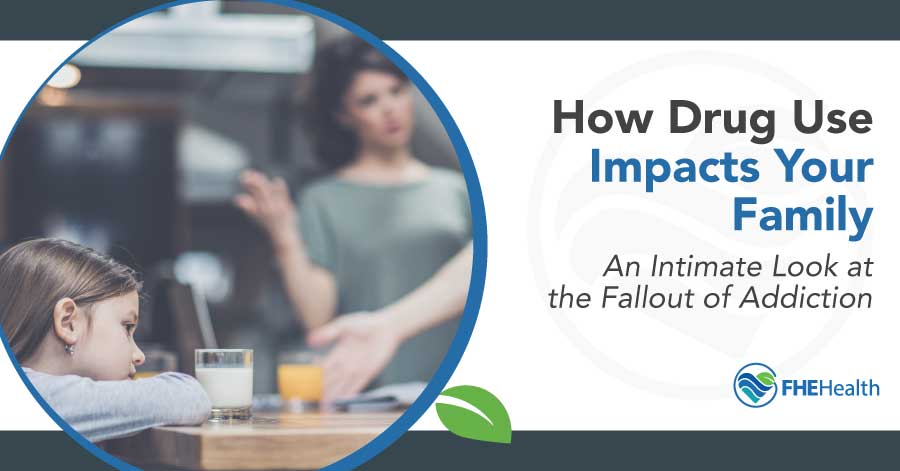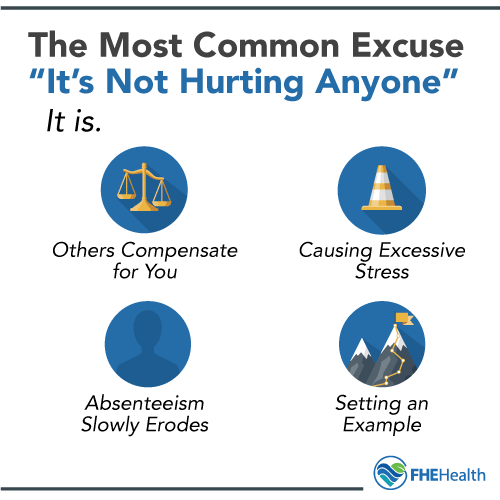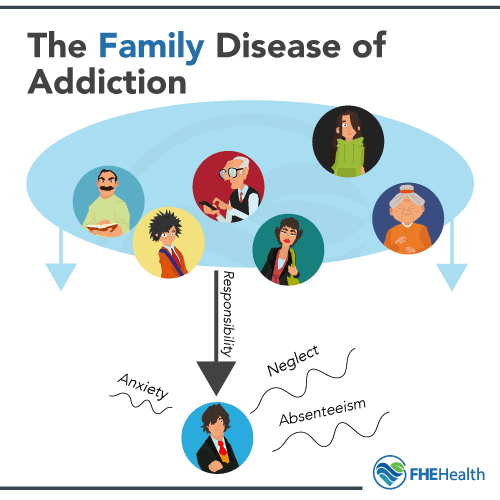
People who take drugs often tell themselves their addiction doesn’t affect anyone other than themselves. Consumed by alcohol or drug abuse, the user typically doesn’t see how their behavior has far-reaching impacts.
According to the Chicago Tribune, drug use by family members not only affects the abuser and their life, but also the lives of family and everyone around them. Consider some of the effects of drug use on families.
It’s Not Hurting Anyone… Is It?
 Addicts often feel that family members and friends should mind their own business because the drug use only affects the user, but this is never the case. This doesn’t mean the addict intentionally hurts family members and friends, but it does mean the person’s actions have a ripple effect on everyone around them. So, the question is, “Do drugs hurt your family?”
Addicts often feel that family members and friends should mind their own business because the drug use only affects the user, but this is never the case. This doesn’t mean the addict intentionally hurts family members and friends, but it does mean the person’s actions have a ripple effect on everyone around them. So, the question is, “Do drugs hurt your family?”
According to the National Center for Biotechnical Information, drug addiction always has a negative impact on families. The extent depends mainly on the family structure and who is addicted. For example, when one parent has an addiction, the other spouse may try to compensate for the addict’s lack of responsibility.
In families with only one parent present, an older child may try to take on the role of acting parent for younger siblings. Parents of an addicted child may experience excessive worry, stress and financial hardships when trying to support a dependent child through treatment, including family therapy.
A Family Disease
A lot of studies have been performed on the exact cause of drug addiction and whether it is genetic. While most of the research as inconclusive, according to the Genetic Science Learning Center at the University of Utah, addiction has an inherited component, meaning it can be passed down from parent to child.
Researchers study large family trees to pinpoint the exact gene that causes drug addiction, and while certain genes seem to have a correlation, there is not one single gene responsible. However, this isn’t why addiction is referred to as a family disease. Addiction is a family disease because it often pushes family members to the breaking point.
It affects the stability of the home and the mental health of everyone involved. Even when someone agrees to rehabilitation, the entire family should be included to ensure their success. There are complete support systems for individuals who have parents, children, siblings or friends who abuse drugs and alcohol.
How Drug Use by Family Members Hurts the Family
 Drug abuse has a ripple effect. Not only is it a health issue, but it can also affect all aspects of a healthy family and cause them to worry.
Drug abuse has a ripple effect. Not only is it a health issue, but it can also affect all aspects of a healthy family and cause them to worry.
Absence: An individual’s absence is one of the biggest social effects of drugs. When alcohol and drugs begin to consume someone’s life, they often look for ways to hide their behavior. They may also try to get away with other addicts to avoid explaining their behavior to family members.
Often, the addict views concern from a family member as nagging, so they try to avoid being at home to escape from family interactions. The loss felt by those at home varies from person to person.
A constant fear of loss: According to the National Institute on Drug Abuse, more than 70,000 Americans died of a drug overdose in 2017. If you’re like most people, you probably know someone personally who died of an overdose, or at least heard of someone close. Family members are often consumed with worry about losing a loved one who suffers from addiction.
Financial impact: Drugs are expensive. An addict may spend hundreds or thousands of dollars on drugs each month, which can cause a financial strain on families. An addict may steal credit cards and cash from other family members, and if the individual starts treatment, the cost can be significant.
Introduction of a criminal element: Many individuals who take drugs are addicted to illegal medications, or they become addicted to pain medications and find alternative ways to get them. This unlawful behavior can lead to jail time if they are caught. More common is the illegal activities that many lower themselves to in pursuit of their next hit.
Changes in behavior: Drug addiction causes changes in behavior that are widespread throughout the home. This is one reason drugs cause people to lose friends. Others can no longer rely on them.
A person may suddenly become rebellious and defiant with parents and siblings, and they may experience mood swings, irrational anger and intense paranoia. Other behavior changes may include verbal and physical abuse against others.
Child Neglect: Children growing up in homes with a parent with a substance addiction are often neglected and abused. In the United States, 40-80% of all child abuse cases are within families where drug and alcohol abuse is also present.
Because individuals with drug and alcohol addictions often put their addiction first, their children may be left to fend for themselves. In extreme cases, children may be removed from the home and placed with other family members or in foster care until the addict seeks treatment.
Loss of Relationships: Addictions destroy relationships. Someone with an addiction may lie to hide it from others and may manipulate friends and family to ensure continued support.
For family and friends, it can be difficult to be around someone with a substance addiction because they may act selfishly or act out in anger over the smallest things. People with addictions often think obsessively about their next fix, which can close them off to others.
Emotional Issues: Family members may feel angry that the person has put them in a situation to deal with family issues on their own. They may also suffer from depression or sorrow because they feel like the situation will never get better. There may be feelings of uncertainty and confusion over what will happen next within the relationship.
Conflict Among Family Members: Addiction can cause negative behaviors and habits within a family. This can often lead to anger and resentment, so family members begin to lash out at one another, especially if one person tends to stick up for the individual with the addiction. Complaints, criticisms and negativity may become the norm, which leaves everyone feeling bad.






